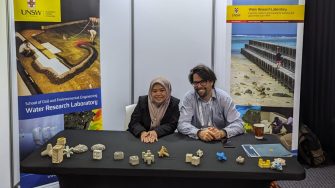Academic visitors propel collaboration beyond boundaries
The Diversity in Engineering Academic Visitors Funding Scheme saw visiting academics travel from the UK, Indonesia, Spain and China as well as interstate.
The Diversity in Engineering Academic Visitors Funding Scheme saw visiting academics travel from the UK, Indonesia, Spain and China as well as interstate.

An inspiring group of academics recently visited UNSW through the Diversity in Engineering Academic Visitors Funding Scheme.
The scheme is designed to enable academics who are women, non-binary, gender diverse or from low- or middle-income countries to visit UNSW Sydney for collaboration, research and meaningful connection.
Throughout the 2023-24 cohort, expertise spanned from water to biomedical engineering.
The latest visitors were:
Each visitor brought something novel to the UNSW engineering community.
Fei Deng said that as a result of Dr Yang’s visit, a new, collaborative project was initiated.
“This visit has successfully achieved its planned goals, including new project collaboration,” said Fei.
“This long-term collaboration will lead to a bunch of joint projects, joint funding applications, joint publications, and joint supervision of PhD students.”
A/Prof Kristin Splinter said that during her month-long visit with the UNSW Water Research Laboratory (WRL), Laura Cagigal laid some important groundwork for collaboration between PhD students, honours students and post-doc students.
“This was a great opportunity to have a younger early career researcher visit WRL,” said Kristin.
“It helped to increase collaboration between groups, and the outputs from the state-of-the-art modelling system that Laura helped introduce will provide necessary data for future engineering projects led by WRL.”
Dr. Wakhidatik Nurfaida undertook several key activities during her visit to UNSW. She participated in the 2023 Australasian Coasts and Ports Conference, the UNSW Water Research Laboratory short course in coastal engineering and coastal hazards and the Narrabeen coastal monitoring beach survey program. Additionally, she presented on her research at WRL and participated in productive discussions around establishing low-cost coastal monitoring in Indonesia.
Dr Mitchell Harley said that Dr. Nurfaida found the visit incredibly rewarding, regarding it as the highlight of her career to date.
“She gained tremendous insight into coastal management practices in Australia through attending the Australasian Coasts and Ports Conference,” said Mitchell.
“She also found it incredibly rewarding to share her insights as a young Muslim woman at the Women in Geoscience and Engineering forum.”
A second-time host of a visiting academic under this scheme, Dr Francisco Cruz says, “one of the main benefits is to encourage further collaborations.”
“In this case, this visit led to fostering other diversity activities. With Pamela, we applied to a Google exploreCSR grant to develop an Australasian-Latin American AI network. Although we did not obtain the grant, the idea is still on the table.”
The Diversity in Engineering Academic Visitors Funding Scheme is aiding UNSW’s commitment to supporting equity, diversity, and inclusion in engineering research. The next recipients under the scheme will be announced in April 2024, and staff can access information here.